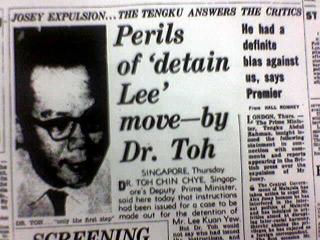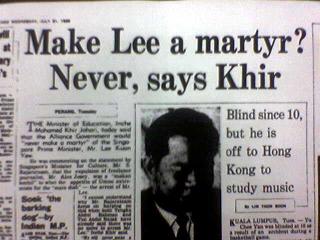Chee Soon Juan [Article first appeared on YourSDP.org]
Dr Chee Soon Juan spoke at the 59th Congress of the Liberal International (LI) at Rotterdam, Netherlands on 25 April 2014. Below are excerpts of his speech.
Let me first express my gratitude for the continued support of LI for me personally as well as for the struggle for democracy in Singapore. LI has been a good friend all these years not just of Singapore but also Asia.
In 2003, Singapore's former prime minister Goh Chok Tong signed the US-Singapore Free Trade Ageement (USSFTA) with then president George W Bush. Singapore became the first country in the world to sign such a pact with the US.
At that time, the USSFTA was touted as a job creator and that the world needed more, not less, free trade. I remember the US Ambassador to Singapore at that time had said that as many as 50,000 jobs would be created in Singapore because of the Agreement.
I wasn't so sanguine. I visited the US and spoke up on the matter, pointing out that without clauses to guarantee human rights and rights of our workers, the trade pact would just help the business elites in the US and Singapore to exploit cheap labour. Of course, given the might of the corporate interests in the US, the USSFTA was quickly passed.
That was in 2003. Ten years have since passed and the FTA has had many years to work its effects. In 2011, US Ambassador to Singapore Mr David Adelman said: "The agreement with Singapore is perhaps our most successful FTA globally.” I have do doubt the FTA is successful, the question is: For whom?
Singapore is very rich or at least has become very rich in the past decade. We have the most number of millionaires per capita in the world. In terms of GDP per capita (at US$57,000), we are the richest country in the world. This is, in large part, due to the influx of a staggering number of billionaires emigrating to the city-state.
Between 2000 to 2012, the richest 10 percent in Singapore saw their real income increase by 4.1 percent. Over the same period, the poorest 10 percent of the population saw a negative change in household income. In other words, the lowest paid workers saw their already meagre wages shrink.

As a result, income inequality has widened. Singapore’s Gini coefficient has been increasing over the last decade (with a break between 2007 and 2008 because of the global financial crisis).

In fact, Singapore's income gap is the highest among advanced economies.

Given the wealth flowing into the country, it is perhaps inevitable that there would be significant economic changes. The Economist Intelligence Unit rated Singapore as the most expensive city in the world in 2014. And yet, about 5 percent of Singapore's workforce draw an annual income of less than US$5,000 – that's less than US$100 a week - in the most expensive city in the world.
In addition, most of the 50,000 jobs that USSFTA promised have gone to foreigners that the Singapore Government has brought in, making unemployment and underemployment a problem in Singapore.
Working conditions have also deteriorated. According to a survey conducted by the International Labor Organisation (ILO), Singaporean workers work the most number of hours. We are the most stressful places to live in Asia and one of the unhappiest peoples in the world. In a survey of 14 economies, Singaporean workers were found to enjoy going to work the least, are the least loyal to their employers and have the least supportive workplaces. Only 19 percent of those polled in Singapore look forward to their work each day, the global average is 30 percent.
These are not just statistics, they have real impact on real lives. Take the case of 46-year-old Tan Jee Suan, his wife, who suffers from polio, and their two teenage sons. An odd-job labourer, Tan had difficulty making enough money to feed his family and they subsisted on his wife’s meagre income of $500 as a factory hand. Tan finally managed to earn a few hundred dollars to buy his wife a bed that made it less of a struggle for her to get herself up in the morning. The family could afford little else. In 2006, unable to cope with the pressure, Tan jumped in front of a speeding train and killed himself.
Behind the facade of wealth and opulence is a city with much hidden poverty.

How is it possible that in the most expensive city in the world, there are Singaporeans earning so little? Because there is no minimum wage. And why is there no minimum wage? Because there is no opposition to fight for it.
The ranks of opposition parties have been decimated with years of persecution, there are no independent trade unions because labour leaders have all been imprisoned or run out of the country. It's not like we have free and fair elections like you practice here. Former prime minister Mr Lee Kuan Yew had said: "Please do not assume that you can change governments. Young people don’t understand this.”
There is no free media – all Singaporean TV stations, radio channels and newspapers are owned and run by the government. Reporters Sans Frontier ranks the Singapore media 150th out of about 170 countries.
I understand the importance of trade, without it modern world comes to a standstill. I also understand that in an imperfect world, no one expects perfect equality. Inequality in wealth and income is inevitable and there is truth that a measure of inequality spurs diligence and entrepreneurship, and, therefore, economic progress. However, extremes in income inequality does not conduce to society’s well-being.
But if we are going to ensure that trade remains sustainable then we must strive to make trade pacts beneficial for all – and I mean from the lowliest worker to the mightiest CEO. In order for this to happen, the Singaporean worker must have rights and not be exploited.
The European Union (EU) is about to sign its own free trade agreement with Singapore. All EU members have to ratify the Agreement and it becomes law.
The EU-Singapore Free Trade Agreement (EUSFTA) makes extensive provisions for businesses. But there is no commitment to ensure that workers and their rights are protected - workers who will, in the final analysis, determine whether businesses are profitable or not and, hence, whether the EUSFTA succeeds or fails.
I will repeat to the EU what I said to the US: Without freedom there can be no free trade. Without democracy there can be no workers rights' and without workers' rights, there is only exploitation. How do you think such a system is sustainable?
Let history not repeat itself only now with Europeans joining in with the Americans to exploit Singaporeans and the peoples in the region. Cheap foreign labour are recruited enmasse from poorer countries like China, Bangladesh, Sri Lanka, and so on to service your businesses in Singapore. They are horrifically exploited.
Let not history remark that Liberals did not have the foresight to see that the EUSFTA, in its current form, is not sustainable. Instead, let us have the courage, the compassion and the conviction to do what is right, not just what makes us rich.
No, I didn't come all the way to Rotterdam to say that things are right in this world. I came because I wanted to be among friends whom I have long believed to be principled defenders of human rights, friends steeped in life's wisdom, friends who instinctively understand compassion. I came to restore my faith in the Liberal family, in humanity; I came because I believe that there are those of us who continue to dedicate ourselves to working for a world that is more equal and more just. Thank you.

Dr Chee Soon Juan is the Secretary-General of the Singapore Democratic Party.

























